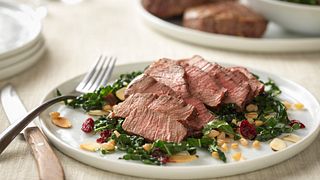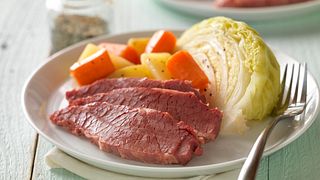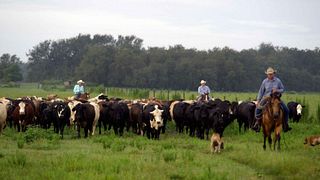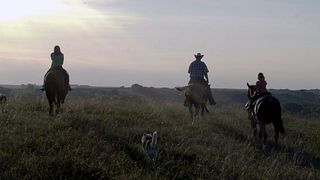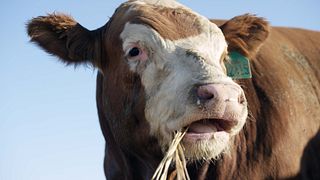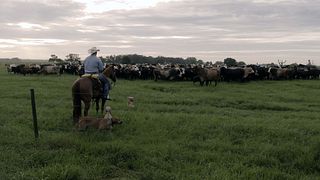New USDA Beef Lifecycle Assessment Finds Environmental Impacts Lower Than Perceived
Hillary Makens | January 16, 2019
A new study, recently published in the journal Agricultural Systems, is the most comprehensive beef cattle lifecycle assessment ever completed. In the report, titled Environmental Footprints of Beef Cattle Production in the United States,1 the researchers found widely accepted measures related to beef cattle’s impact in the U.S. are often overestimated.
The comprehensive lifecycle assessment, conducted by the USDA’s Agricultural Research Service and The Beef Checkoff, was designed to scientifically quantify the sustainability of U.S. beef production. This was accomplished by collecting and examining feed and cattle production-related data from more than 2,200 cattle producers in seven regional production areas. Conclusions were derived using a simulation model and the regional production data to estimate national impacts in greenhouse gas (GHG) emissions, fossil energy use, blue water consumption and reactive nitrogen loss.
Notable study findings include:
- Greenhouse gas emissions: Beef production, including the production of animal feed, is responsible for only 3.7 percent of greenhouse gas emissions in the U.S. This is dramatically lower than the often-misapplied global livestock figure of 14.5 percent2. Furthermore, through continuous improvements in production practices, U.S. beef farmers and ranchers have avoided 2.3 gigatons of carbon emissions since 19753.
- Grain feed consumption: Per pound of beef carcass weight, cattle only consume 2.6 pounds of grain. This is comparable to feed conversion efficiencies of pork and poultry. Additionally, nearly 90 percent of grain-finished cattle feed is inedible to humans, meaning these plants can only provide value to humans when they’re upcycled by cattle into high-quality protein.
- Corn feed consumption: Corn used to feed beef cattle only represents approximately 9 percent of harvested corn grain in the U.S., or 8 million acres. By comparison, 37.5 percent of corn acreage in the U.S. is used for producing fuel ethanol4.
- Water use: On average, it takes 308 gallons of water to produce a pound of boneless beef. Previous reports have estimated upwards of 24,000 gallons5. Additionally, water use by beef is only around 5 percent of U.S. water withdrawals, and this water is recycled.
- Fossil fuel inputs: Total fossil energy input to U.S. beef cattle production is equivalent to 0.7% of total national consumption of fossil fuels.
“This lifecycle assessment delivers the most comprehensive and accurate assessment of the environmental impact of beef cattle in the U.S. to date,” said USDA researcher and study co-author Alan Rotz.
The study assessed cattle production in the farm and ranch portion of the beef supply chain, including emissions associated with energy, feed, machinery, seed, pesticide and other resources used in production. Related work is in-progress to assess production further down the supply chain, including processing, packing, distribution, retail, consumption and waste handling. Together, these reports will comprise the most detailed and comprehensive assessment of U.S. beef’s sustainability to-date.
“This work produces baseline data the cattle industry can use to continue to improve the environmental and economic sustainability of U.S. beef,” said Sara Place, Ph.D., study co-author and Senior Director of Sustainable Beef Production Research at the National Cattlemen’s Beef Association, a contractor to the Beef Checkoff. “Investments in this type of research demonstrate a continuous commitment to environmental stewardship by America’s farmers and ranchers.”
About the Beef Checkoff
The Beef Checkoff Program was established as part of the 1985 Farm Bill. The checkoff assesses $1 per head on the sale of live domestic and imported cattle, in addition to a comparable assessment on imported beef and beef products. States may retain up to 50 cents on the dollar and forward the other 50 cents per head to the Cattlemen's Beef Promotion and Research Board, which administers the national checkoff program, subject to USDA approval.
About NCBA, a Contractor to the Beef Checkoff
The National Cattlemen’s Beef Association (NCBA) is a contractor to the Beef Checkoff Program. The Beef Checkoff Program is administered by the Cattlemen’s Beef Board, with oversight provided by the U.S. Department of Agriculture.
- CA Rotz, S Asem-Hiablie, S Place, G Thoma., 2018. Environmental footprints of beef cattle production in the United States. Agricultural Systems. Advance online publication. doi.org/10.1016/j.agsy.2018.11.005
- http://news.trust.org/item/20180918083629-d2wf0
- UN FAOSTATdatabase. Available at http://www.fao.org/faostat/en/#home
- https://www.ers.usda.gov/data-products/us-bioenergy-statistics/
- Pimentel, D. J. Houser, E. Preiss, O. White, H. Fang, L. Mesnick, T. Barsky, S. Tariche, J. Schreck, and S. Alpert. 1997. Water resources: Agriculture, the environment, and society. BioSci. 47: 97-106.3

